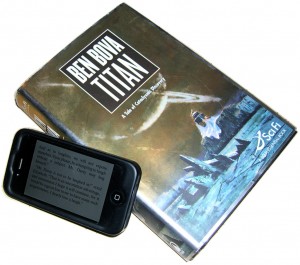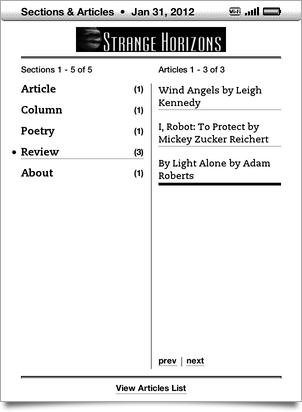Tag Archive: “books”
McCalibre: Multi-Column Stylesheet for the Calibre Ebook Viewer
I use Calibre primarily to organize ebook files and send them to my Kindle, but it also includes a serviceable ebook viewer for reading books on the computer. Like most ebook renderers, the viewer is based on a web browser. The user can even specify their own stylesheet to customize exactly how the text is displayed.
I created a stylesheet which displays the text in multiple columns, like McReadability. I dub it McCalibre. I posted the code and a more thorough description on the Calibre forums. As noted in the forum post, it only works with the viewer’s “flow” mode, not the “paged” mode. Here’s what it looks like:
I’ve also posted the code at GitHub, where I will upload any worthwhile revisions.
Posted on Wednesday, September 26th, 2012. Tags: books.
Interleaved Reading

Typically I only read one novel at a time. At present, however, I am reading Ben Bova’s Titan as well as Jane Austen’s Pride and Prejudice. These novels are sufficiently distinct that I don’t think I’ll have any trouble keeping the stories straight – although both are certainly set in alien environments. Fortuitously, both books have short chapters, making it feasible to alternate between them whenever I sit down to read.
My hope was that these books would complement each other as part of a balanced fictional diet. Titan has big ideas and a technically intriguing setting, but, admittedly, its characters perform like cardboard character actors (a risk of its subjective yet superficial third-person perspective, I suppose). An exception is Titan Alpha, the rover whose misbehavior is the most interesting enigma I’ve encountered in the story. Titan Alpha is a viewpoint character.
I like it when a character cracks a joke and it still seems fresh despite the knickers and two hundred year old diction.
Pride and Prejudice portrays people with much more nuance, although they are all perhaps a bit too snooty to earn much sympathy from me. (I realize that this impression may well be intentional, given the title.) What I like most about Pride and Prejudice is the language – the sentences themselves exhibit a variety of structure that is a pleasure to unravel, yet never too baroque to understand. I like it when a character cracks a joke and it still seems fresh despite the knickers and two hundred year old diction. Whether it is Austen’s own style or simply English of the era that I enjoy, I cannot say.
I’m only about a quarter of the way through each book, so the impressions above shouldn’t be construed as final reviews. Mainly, my intent is to compare what I’ve noticed in the process of alternating between books.
So, do you ever select books based on what you perceive to be their complementary properties? Are you a gourmet, seasoning your reads with sweet and sour, or is your mind a furnace into which you must shovel as many ideas and experiences and as possible?
Posted on Tuesday, September 18th, 2012. Tags: books.
Paying Attention to Point of View
Last month, SF Signal published a two–part “mind meld” on point of view in fiction. Earlier this year, the folks at Writing Excuses discussed the omniscient viewpoint. I encountered all of these discussions recently, and it got me thinking about point of view. At first I found it challenging to recall the perspective of books I’d previously read, even if they were among my favorites. With concentration, however, I realize I can figure it out for most examples that come to mind.
(Sometimes it’s obvious. It’s a good bet that stories with large ensemble casts – like The Song of Ice and Fire, to name a popular example – are told from a third person perspective that can follow the separate adventures of multiple characters.)
Conflicts are revealed from multiple perspectives; tension arises from wondering how these perspectives will converge – or collide.
In contrast to my fuzzy recollection of the narrative perspective of some past reads, I feel acutely aware of point of view now that I’ve encountered the discussions mentioned above. I am reading Ben Bova’s Titan, and the third person perspective seems conspicuous. Conflicts are revealed from multiple perspectives; tension arises from wondering how these perspectives will converge – or collide. The plot becomes an almost secondary source of suspense.
I can’t say that I prefer one perspective over another (well, second person perspective sure is an odd duck1), but I do think it enriches the reading experience to better understand how a story is told. There’s a parallel with science here: knowledge does not sap a system of wonder, but rather equips you recognize and appreciate its even deeper mysteries.
- To read a fascinating visual analysis of the “Choose Your Own Adventure” format, you decide to check out Christian Swinehart’s One Book, Many Readings.
Posted on Tuesday, September 11th, 2012. Tags: books, sf, sfsignal, writingexcuses.
Thinking Critically About Tolkien
 The works of J.R.R. Tolkien have had a tremendous impact on fantasy fiction and, arguably, on popular culture. Renowned for the scope and rigor of its conception, Tolkien’s Middle Earth is familiar to many as an exemplar of the fully-imagined secondary world, replete with language, history, and a complex mythological (if not moral) landscape. World-building of such detail provides a potentially powerful framework for fascinating story-telling – and indeed, the epic quest of the Fellowship of the Ring set the mold for generations of subsequent adventure stories.
The works of J.R.R. Tolkien have had a tremendous impact on fantasy fiction and, arguably, on popular culture. Renowned for the scope and rigor of its conception, Tolkien’s Middle Earth is familiar to many as an exemplar of the fully-imagined secondary world, replete with language, history, and a complex mythological (if not moral) landscape. World-building of such detail provides a potentially powerful framework for fascinating story-telling – and indeed, the epic quest of the Fellowship of the Ring set the mold for generations of subsequent adventure stories.
Yet for all its influence and entertainment value, The Lord of the Rings is not beyond critique. Here I would like to share a few thought-provoking criticisms from other authors I respect. My intent is not to negate your enjoyment of Tolkien, but to enrich the way you think about what you read and how it relates to the “real world” in which you live. That, at least, is the impact these ideas have had on me.
The quotes I’d like to relay share a concern with the worldview and political structure evident in the quasi-medieval culture of Middle Earth. Plots are driven by conflict and conflicts can reasonably emerge from the social environment characters occupy. It is not necessarily the society of Middle Earth itself that these authors object to, I think, but the way in which Tolkien aligns thematic elements of good and evil – of propriety and upheaval – with elements of that setting.
 Consider Fantasy and revolution: an interview with China Miéville, conducted by John Newsinger, from the autumn 2000 issue of International Socialism Journal. Miéville is an author closely associated with the “New Weird” and a vocal observer of real-world social issues. Here, he fingers Tolkien’s romanticization of feudalism, a recurring theme in fantasy criticism:
Consider Fantasy and revolution: an interview with China Miéville, conducted by John Newsinger, from the autumn 2000 issue of International Socialism Journal. Miéville is an author closely associated with the “New Weird” and a vocal observer of real-world social issues. Here, he fingers Tolkien’s romanticization of feudalism, a recurring theme in fantasy criticism:
If you look at stereotypical ‘epic’ or ‘high’ fantasy, you’re talking about a genre set in magical worlds with some pretty vile ideas. They tend to be based on feudalism lite: the idea, for example, that if there’s a problem with the ruler of the kingdom it’s because he’s a bad king, as opposed to a king.
In a January 2002 Socialist Review article titled Tolkien – Middle Earth Meets England, Miéville elaborates on the problem of simplistically categorizing characters as good or bad:
Tolkien wrote the seminal text for fantasy where morality is absolute, and political complexities conveniently evaporate. Battles are glorious and death is noble. The good look the part, and the evil are ugly. Elves are natural aristos, hobbits are the salt of the earth, and – in a fairyland version of genetic determinism – orcs are shits by birth. This is a conservative hymn to order and reason – to the status quo.
And all dwarves love gold!
Miéville does temper his critique. He has kind things to say about the Lord of the Rings movies (then just released) – “Jackson beefs up Tolkien’s rizla-thin women, turning them into actual characters” – and even admits admiration for aspects of the original:
it would be churlish to claim that there’s nothing to admire in the book. The constant atmosphere of melancholy is intriguing. There are superb, genuinely frightening monsters, and set pieces of real power.
But the bottom line is clear. Miéville admires the world-building, and embraces the inventive modes of story-telling possible with fantasy, but feels let down by the direction of Tolkien’s vision:
He established a form full of possibilities and ripe for experimentation, but used it to present trite, nostalgic daydreams. The myth of an idyllic past is not oppositional to capitalism, but consolation for it. Troubled by the world? Close your eyes and think of Middle Earth.
China dismisses most charges of escapism as genre snobbery – “just because [non-genre] books pretend to be about ‘the real world’ doesn’t mean they reverberate in it with more integrity” (ISJ) – but, ultimately, faults Tolkien for exactly that – escapism. Or, more accurately, for making too little of the liberating opportunities afforded by literary escape.
 Next I’d like to recommend J.R.R. Tolkien vs. The Modern Age, a 2002 essay by David Brin. Only an excerpt is available online, but the full text can be found in Through Stranger Eyes, an interesting collection of essays, reviews, and other non-fiction by Brin.
Next I’d like to recommend J.R.R. Tolkien vs. The Modern Age, a 2002 essay by David Brin. Only an excerpt is available online, but the full text can be found in Through Stranger Eyes, an interesting collection of essays, reviews, and other non-fiction by Brin.
Brin’s critique affirms Miéville’s concern with the backwards-looking undercurrents of The Lord of the Rings. He extends this argument and situates it in historical context with a comparison of Romanticism and Enlightenment ideals.
He also asks the unsettling question of whether fantasy fans may, somehow, develop a misplaced fondness for the archaic social order familiar to their favorite characters:
Indeed, the popularity of this formula [LOTR’s] is deeply thought-provoking. Millions of people who live in a time of genuine miracles – in which the great-grandchildren of illiterate peasants may routinely fly through the sky, roam the Internet, view far-off worlds and elect their own leaders – slip into delighted wonder at the notion of a wizard hitchhiking a ride from an eagle. Many even find themselves yearning for a society of towering lords and loyal, kowtowing vassals.
I don’t think I’ve ever yearned for that, but I certainly root for the good guys to crush the bad. That’s almost instinctive. Brin wonders: what does this moral partitioning reinforce in our own worldview when used for dramatic effect in fiction? The device is hardly unique to The Lord of the Rings, of course, but once more the hapless orcs serve as an example:
The urge to crush some demonized enemy resonates deeply within us, dating from ages far earlier than feudalism. Hence, the vicarious thrill we feel over the slaughter of orc foot soldiers at Helm’s Deep. Then again as Ents flatten even more goblin grunts at Saruman’s citadel, taking no prisoners, never sparing a thought for all the orphaned orclings and grieving widorcs. And again at Minas Tirith, and again at the Gondor Docks and again… well, they’re only orcs, after all.
There is a strain of dismay with industrialization in Tolkien’s work. This is understandable, considering the threat mechanization poses to traditional Shire-like lifestyles –
the good guys strive to preserve and restore as much as they can of an older, graceful and ‘natural’ hierarchy, against the disturbing, quasi-industrial and vaguely technological ambience of Mordor, with its smokestack imagery and manufactured power-rings that can be used by anybody
– but Brin offers a compelling rebuttal to Tolkien’s tactic of nostalgic withdrawal:
The planet was certainly less abused when our numbers were kept low by poverty, starvation and disease. Now we must replace those old corrective forces with new ones – knowledge, foresight, and self-restraint.
So say we all.
•
I think it’s charming that Miéville, an avowed “active revolutionary socialist”, and Brin, a champion of the Enlightenment tradition and pragmatic American know-how, find so much common ground in their critical readings of Tolkien – and also in their use and espousal of the fantastic and the futuristic as lenses to perceive our path through the present.
•
I hope you agree with my initial assurance that the critiques I’ve shared here do little to detract from the stories they dissect. If this post has exposed you to any new ideas, or nudged you to consider what you expect from fiction, or perhaps even caused you to articulate a rebuttal of your own against any of the charges recounted here, then I consider it a success.
I do not think the quotes I’ve selected do justice to each author’s arguments (least of all Tolkien’s), so please consider reading the source materials in their entirety. If you haven’t read The Lord of the Rings, start with that!
For Tolkien criticism of a different sort – more reverential, perhaps, but rife with insight into the structure and function of fiction – check out Corey Olsen’s extensive Tolkien Professor podcasts.
Posted on Thursday, March 15th, 2012. Tags: books, reviews.
Ebook Recipe for Safari Reading List
Reading List is a Safari browser feature that helps you bookmark articles you want to read later. Calibre is an ebook utility program. I wrote a script for Calibre that generates an ebook of the articles in your Reading List, so you can read them at your leisure on the device of your choice.
Click here for a more detailed introduction and instructions…
Posted on Thursday, February 9th, 2012. Tags: books, code, readinglist, recipe, safari.
Ereader Assessment
I’ve had a Kindle for about a year now and have used it quite a lot (but by no means exclusively).
Recently, I had a chance to play around with a Nook Simple Touch. I thought I would share a few observations for the benefit of anyone interested in comparing these ereaders.

The Kindle 3 keyboard and “SYM” punctuation menu.
Click here to read the rest of the post…
Posted on Wednesday, February 8th, 2012. Tags: books.
Strange Horizons ebook issue generator
 Attentive readers may notice I’ve been on a bit of an ebook kick recently. Here’s a tool I made to generate ebook issues of Strange Horizons, an SF magazine:
Attentive readers may notice I’ve been on a bit of an ebook kick recently. Here’s a tool I made to generate ebook issues of Strange Horizons, an SF magazine:
Strange Horizons is a weekly magazine of and about speculative fiction. Calibre is a free and open source ebook library management application.
Calibre has an extensible system “for downloading news from the Internet and converting it into an ebook.” The scripts Calibre uses to retrieve and format news are known as recipes. Recipes can be configured as simple RSS readers or as custom Python scripts using Calibre’s recipe API.
Strange Horizons is published online as a web site. This Calibre recipe retrieves the current issue of Strange Horizons and outputs an ebook suitable for reading on a Kindle or other ereader device.
The script and other details, including installation and usage notes, are available on GitHub. It is included with Calibre since Calibre version 0.8.38.
Update, March 4, 2012: This script has been acknowledged on the Strange Horizons blog.
Posted on Tuesday, January 31st, 2012. Tags: books, code, recipe.
Text Justification with the Kindle Collections Plugin for Calibre
I recently mentioned that I used Calibre to enable left justification on my Kindle. More precisely, the justification option is a minor feature of the Kindle Collections plugin. The plugin’s primary purpose is to help organize collections on your Kindle. I find it a bit complicated for that purpose, but I was happy to discover a way to enable left justification. (Turns out there are other ways to do it, too.) Full justification looks great when typeset well, as is usually the case in printed books, but in some circumstances it doesn’t appear quite so stately on the Kindle. In these cases, I prefer the “ragged right” of left justification to distracting gaps or rivers within the text itself.
Like screenshots? Read on for a step-by-step guide.
Posted on Monday, January 30th, 2012. Tags: books.
Calibre Content Server

Calibre is an ebook management application. You can use it to convert ebooks to different formats, to edit metadata, or to organize and browse your ebook library. It can also act as a “Content Server”, providing an easy way to publish a searchable online catalog of your ebooks. This feature is useful for accessing your ebooks on different computers and devices. It could also be useful for libraries or research groups interested in sharing material over the internet.
In this post, I’ll show how to setup the Calibre Content Server and share a few examples.
Posted on Thursday, January 26th, 2012. Tags: books.
Orbital Drop eBooks
Do you like science fiction and fantasy? Do you read ebooks? You might want to check out The Orbital Drop, a monthly deal on an ebook title from publisher Orbit Books.
The currently discounted title is Consider Phlebas, the first novel in Iain M. Banks’ Culture series. It’s far-future space opera. Now, I am known to opine that science fiction is made of richer stuff than just rockets and robots, but hey – I like rockets and robots, too.
I read a more recent Culture novel last year (Matter). While enjoyable, I recall that it felt a bit haphazard, as if I’d tuned in to a series too late to catch the introduction and was relying on recaps to catch up – which is evidently exactly what I did. So, for $0.99, I’ll pop Consider Phlebas into the queue and enjoy the world-building from the beginning.
Posted on Tuesday, April 5th, 2011. Tags: books, reviews, tbr.
